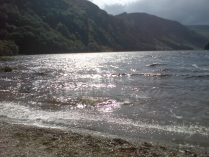I feel it is important to state very early in this review that I consider Wind Strategy to be a Very Important Book for sailors.
The reason I feel the need to state this is because I know what I am about to write, and it may come across that I actually think otherwise. So, in order to be clear on the matter, let me state it again:
Wind Strategy is a Very Important Book.
I know this for three reasons.
- The first is that, a few years ago, I attended a talk on sailing which was delivered by a very good sailor who was also the son of a couple of sailmakers. After the talk I was chatting to him and he said that I would find two books very useful: the first was High Performance Sailing by Frank Bethwaite (about which more on another day); the other was Wind Strategy.
- The second reason is that Nick Craig mentioned the book by name when I interviewed him last year as one of the most useful books he has read about sailing.
- And finally, Lijia Xu’s fascinating book, Golden Lily, has a small bibliography at the book of thirteen books. One of the chosen few happens to be Wind Strategy.
So two World Championship winning sailors have specifically recommended this book to me, and an Olympic Gold Medal winner also lists it as one of her most influential books.
So you see – it is a Very Important Book.
Having said all that…
My dad is an engineer by profession and, as such, he tends to have a scientific mind. He is interested in the mechanics behind things – the if/then scenarios. He likes to know why things happen the way they happen.
He has told us many different stories to illustrate this. For instance, as a child he would cycle his bike halfway around the block from his house and, rather than enjoying his ride like a normal human being, he would then take bits of it apart so he could see the inner workings, before putting it back together and riding home.
There is always a very slight, but definitely discernible, hint of reproof when he tells us stories like this – I think he’s slightly disappointed that none of his children are as weird as scientifically inquisitive as he is.
Because of this scientific inclination, and his passion for sailing, my dad has always been interested in the weather and so, before most important sailing days, he would pull me aside to give me the lowdown on the weather forecast and the likely implications for the racing that day.
Over time, as my listening skills developed, I came to value these talks immensely: firstly, whilst he pontificated on about surface and gradient winds, and developing sea breezes, and likely wind bends, and interesting land features, I could let my mind wander over the things that really mattered to me – like whether or not the good looking girl from Harwich Yacht Club was there, or how many chocolate bars I could buy with my pocket money. And, as I grew more skilled at listening, I could tune in to the only bits of his ongoing lecture that mattered to me: I would perk up when he said things like “…and so, for those reasons, I think the right hand side of the beat should pay in the morning” or “…and because of that, expect the sea breeze to come in from that direction at around 2 o’clock”.
All of which is a long-winded way of saying that I feel the same way about Wind Strategy as I do about my dad’s lectures on the weather:
- I accept they are full of interesting facts
- When I attempt to engage with them, my mind tends to wander off
- I like the bits that summarise neatly the nuggets of information that I can use
I think it is fair to say that so far I haven’t fully benefited from all that Wind Strategy has to offer. I have a couple of favourite chapters: the first is “At the Regatta” – a brilliant summary of the steps one should go through in the week leading up to an event and during the event itself. It lays out all the little things to look out for, and it has been great at getting me into good habits in terms of how I think about the weather during an event.
I also love the “Popular Racing Venues” section. It is not only useful if you are going to be sailing at a particular venue, but it also lays out nicely how you should be analysing venues that you race at yourself. Another very good habit to get into.
Other chapters are for brighter minds than mine. I found the two chapters on sea breezes excellent when I got my first copy, and the chapter on “The Message of the Clouds” is very useful – a must read for dinghy sailors, in fact.
But then there are chapters like “Gravity Waves, Billows and Surges” and “Wind Bands, Water Temperature and the Tide”. I have a strong suspicion that if I were to ever understand these chapters then I might sail faster, but that’s why I have a dad – I can let him read it and then he can tell me the what to do.
However, if you have been careless enough to have failed to secure a dad like mine; or, indeed, if you are a dad like mine, then you should probably read these chapters too.
You’ll probably start winning world championships and Gold Medals.
Wind Strategy is, after all, a Very Important Book.
You can get hold of a copy of Wind Strategy by David Houghton and Fiona Campbell here:

